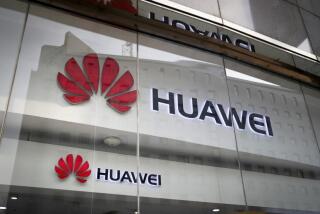How Wireless Poses Threat to Cellular Firms : Telecommunications: A lack of FCC restrictions means foreign investment could pour into the new technology.
- Share via
WASHINGTON — Cellular telephones, which took a beating on Wall Street in response to a recent cancer scare, will soon face another threat to their rapid growth: the launch of new “wireless” phones that some analysts predict could eclipse cellular devices.
Using a portion of the radio spectrum now employed mainly by taxi dispatchers, Fleet Call Inc. will offer wireless telephone service in Los Angeles in August. Next year, the Rutherford, N.J., firm will expand wireless service to New York and Chicago, followed by Dallas and Houston in 1995.
But that’s just the beginning.
The Private Radio Bureau of the Federal Communications Commission is expected this month to recommend that the FCC vastly expand wireless phone services (known as “specialized mobile radio”) by setting aside additional airwaves and licensing providers on a nationwide basis to encourage the technology.
The push for expanded wireless phone service is the latest of several new telecommunications services to emerge in recent months in the wake of the FCC’s efforts to promote competition in the communications industry.
In January, the FCC approved a new satellite paging system to let people send and receive brief messages anywhere on the globe. That move came just weeks after the commission proposed a new cellular-style video competitor to cable TV.
The emergence of such services has coincided with advances in digital technology that have produced such breakthroughs as 500 cable channels, electronic telephone voice mail and interactive video. By converting signals to a digital computer code of ones and zeros, communications providers can transmit more information faster, more reliably and more cheaply.
But, as a result of the new push for competition, many analysts who a few months ago were touting cellular companies as among the hottest growth stocks now see trouble for the industry.
Specialized mobile radio, wrote Prudential Securities analyst John L. Bauer III in a recent report, represents “a ticking time bomb for cellular values. . . . The emergence of meaningful competition in the cellular arena is something that should concern more than just cellular investors.”
Jack Bulkley, president of Nordberg Capital Inc. in New York, also thinks specialized mobile radio will pose a significant competitive threat to cellular.
Bulkley notes that because specialized mobile radio is already digital, it has a significant technical advantage over cellular service. He also said that because private mobile radio services are less highly regulated than cellular and free of federal limits on foreign investment, the industry may attract capital more easily than did cellular.
“The cellular industry is going to have to spend a lot of money to convert its customers from analog service to digital,” Bulkley said. “And a lot of foreign money could” pour into specialized mobile radio, he added.
But the cellular industry, which in the past vigorously opposed private mobile radio, now insists it can compete if the FCC loosens restrictions on the industry.
“The cellular industry today realizes that their past opposition to (private mobile radio) was short sighted,” said Thomas Wheeler, president of the Cellular Telecommunications Industry Assn., a Washington trade group.
“Today we are saying, ‘Let the competitors in and let us compete too,’ ” Wheeler said.
More to Read
Inside the business of entertainment
The Wide Shot brings you news, analysis and insights on everything from streaming wars to production — and what it all means for the future.
You may occasionally receive promotional content from the Los Angeles Times.










